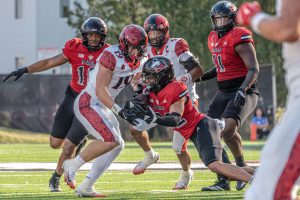SA considers online election process
January 26, 2004
After only 1,279 of 24,948 students voted in last year’s Student Association executive election, NIU officials are deciding how to stop a declining voter trend and increase student interest.
Rick Clark, director of University Programming & Activities and SA adviser, said online voting is an option that intrigues him.
“We are looking at various options to try and increase voter turnout, but the way we have things set up right now, I just don’t think it’s the best setup in order to get the maximum of students voting,” he said. “So we are looking into online voting and what’s out there and what options are available to NIU students to get the most cost-effective system.”
Andrew Nelms, SA student speaker and chairman of the senate committee on rules and procedures, said he is less than enthusiastic about online voting.
“It would require an entire overhaul of our election policy, which would need to be gone through with a fine-tooth comb to see where exactly this would affect it,” he said. “This has been talked about for as long I have been here at NIU. I just don’t think it would necessarily be a benefit to our campus. My first and foremost concern is how this would affect voters as far as the potential for voter fraud.”
Nelms said the earliest a bill regarding online voting would reach the full senate would be next fall, which would leave enough time for its implementation for the 2005 SA executive election.
Clark said voter apathy contributes to low turnout as much as anything.
“I just don’t think our students care enough about what is going on with student government to get involved,” he said. “The students seem to get motivated when there is a cause taking place. They need something else to light that fire under them. The last couple of years we haven’t had any.”
NIU President John Peters said the problem is not unique to NIU.
“I have been at several universities in my career and have observed many student elections, and the turnout is always low,” he said. “The primary focus of most of our students is, as it should be, getting a quality education and focusing on that. They are here for a relatively short period of time, and perhaps they feel that because of that short period of time, they are here to get an education.”
Nelms said it should not take controversy or convenience for students to vote.
“Simply making it easier for people to vote is not the answer,” he said. “I think it’s up to the candidates to educate, inform and excite students to vote.”
For now, the SA is taking a decidedly low-tech approach to reaching students. Nelms said a recently funded bill will allow for the creation of promotional materials, such as large banners, to put outside polling places.
The next SA executive election is scheduled for March 30 and 31.






